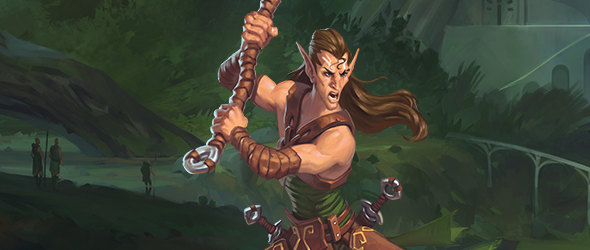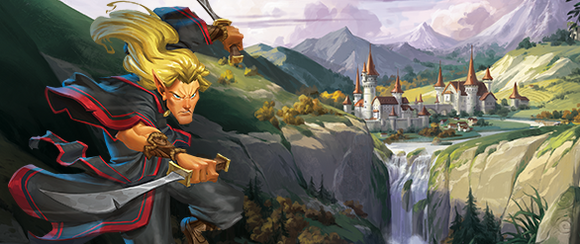Even to those who work or trade with them regularly, the ancient race of Elves is the very definition of mysterious. Simultaneously familiar and remarkable, at least to Humans, almost everything about them is an intoxicating, surreal collection of contradictions. They are commanding, yet effortlessly graceful. Mirthful, but ancient and wise. Withdrawn, though compassionate and kind. Elves live for so long, that some believe them to be immortal. They maintain their beauty throughout their lives, combining ancient wisdom and youthful mirth.
In the language of the Latari, Elves are called the Ylwe. When the denizens of Terrinoth think of Elves, they usually think of the Elves belonging to the Latari Tribe, who have dwelled in the Aymhelin Forest since time immemorial. Yet Elves have developed several distinct cultures in the tribes scattered across Mennara: the Deep Elves in the Dunwarr Mountains, the Salish Tribe in Isheim, and the Nivalis and Feredel tribes of even more distant, legendary lands. Those who wander Mennara follow the siren calls of righteousness, adventure, and lost knowledge.
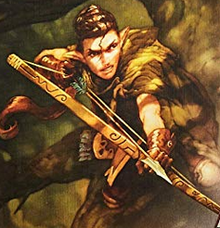
Appearance
Despite being elegantly lithe and often preternaturally beautiful, at a glance, most Elves could be mistaken for Humans: their hair, skin, and general proportions tend to run a gamut similar to that of Humans. However, farther into the wilderness, where the Elves have dwelled alongside nature for millennia, those similarities tend to fade. In these primordial and forbidding places, Elves possess sharper, more distinctly inhuman features and coloring that strongly resembles the natural world around them. Their hair or eyes may be as white as a falling star, as green as an emerald, as burgundy as ripe grapes, or as scarlet as a turning maple leaf.
Society
Elven society has spent millennia slowly evolving into two distinct groups: the highborn nobility and everyone else, considered "lowborn" by comparison. The highborn are those Elves only one or two generations removed from the Elves of Emorial and Latariana's time. They occupy almost all positions of power in the court, temples, or military of the tribes. In the court of the Latari Tribe, they vie for King Aeoneth's favor and make great shows of forming alliances and working toward agendas that are in the “best interests” of all Elvenkind. Those highborn Elves who have never left the comfort of Lithelin are referred to as the "Eolam," or blue-bloods. They nominally work together to return the Elven peoples to the Empyrean or root out the vestiges of the Ynfernael from this world. Meanwhile, they secretly work toward sabotaging their rivals and enhancing their own influence and prestige. Elsewhere, highborn serve as tribal leaders and the arbiters of Elven culture.
The lowborn Elves are those born several generations removed from the ancient ones. The tribes' artisans, craftspeople, hunters, and warriors tend to be drawn from this lower caste of the Elves. Because of Elves' incredibly long lives, lowborn Elves have little chance for advancement—only in times of great tumult and grave losses are the upper positions in Elven society opened up, and not without great hesitation. Instead, most lowborn Elves dedicate themselves to becoming masters of the various vocations that their tribes need for survival. Lowborn Elves of the Latari Tribe often live in the wilder regions of the Aymhelin and enjoy a life more in tune with the natural cycles of the world, calling themselves the "Verdelam," or green-blooded. They dwell in and among the trees, hunt the various game that roam the woods, and trade for the few necessities the deep forest doesn’t provide. Sometimes, lowborn Elves journey out into the world in search of adventure, fame, and fortune. Many of them take residence in Human and other cities where they establish their own societies alongside the natives quite independent of Latari societal structures.
Culture
Elven culture varies widely between the various tribes, yet a few common threads run throughout their species. The majority of Elves prefer a reclusive, isolated existence and interact only with other Elves. They possess a certain air of superiority when it comes to dealing with the younger races. The Elves achieved marvelous technological advancements and formed complex societies while the rest of the world was still hunting and gathering, so they grew to depend solely on their own kind.
When Elves do interact with the other races, typically during the course of trade or adventure, most are compassionate and kind—although their benevolence comes with a very noticeable condescension. Elves have spent millennia waiting for the rest of the world to mature to their level, a fact they are not shy about expressing in the most paternalistic way possible. To discuss politics with Elves is to suffer endless quips about the superiority of Elven court, to ask for their help is to invite a lecture on personal growth, and showing baser emotions to them is to provoke several “tsk, tsks” and deeply disappointed stares.
Names
Elven parents are well aware that an elf child will be stuck with their name for centuries, and so they take their time naming a new baby. Some elves go twenty years without a name as their parents consider. Elves often have poetic family or tribe names in addition to their given name, and they frequently translate these names into the language of those they speak with, so all might appreciate their meaning.
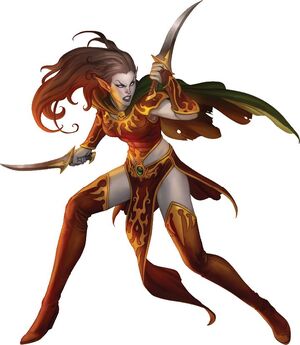
Deep Elves
All Elves feel the pain and loss of falling from the Empyrean to dwell among the younger races, and many are striving to ascend again. However, the Tribe of the Deep Elves (the Malcari) feels an additional, far more ignoble shame: they fell not once but twice, the second time to Malcorne’s corruption.
Called Deep Elves for the elaborate networks of tunnels they inhabit, they were drawn underground because of the proliferation of Ynfernael gates beneath the surface. Now these Elves generally only emerge above ground to hunt for new sources of Ynfernael power or when their crusade against the otherworldly demons forces them to do so. Their endless crusade has drained them of any dregs of mercy or compassion, however, as the dark powers they use to fight the Ynfernael slowly poisons their souls. Many adventurers who stray into these underground lairs are lucky to escape with their lives, for the Deep Elves do not suffer trespassers or the inquisitive.
Those who survived the War of the Shadow Tear—the darkness that enveloped Mennara long before the mortal races came into being—have spent their long lives trying to atone by hunting Ynfernael creatures through their rapidly expanding network of tunnels. The Deep Elves have an almost singular focus in this crusade and will stop at nothing to purge the Ynfernael from the world, as well as purge their still-fallen counterparts, the Daewyl Elves who remain committed to evil.
However, there are those who feel that this drive is leading their clan down a dangerous path, as their search for a strategic advantage finds them ever more willing to embrace any power that may help them in their quest. This means that many Elves, including some among the Deep Elves themselves, are watching things unfold with a wary eye, guarding diligently against the day when the rest of the Elves might again be forced to wage war against their cousins.
Free Cities Elves
Although there are many ways for Elves to escape the rigid caste system of their society, it is the Free Cities Elves who do it the most brazenly. Those who refer to themselves as Free Cities Elves, a voluntary colloquialism, are Elves who have forsaken their tribe or were born to Elves who did. They have chosen to live alongside the short-lived races as urbanites and are most commonly found in cities such as Dawnsmoor and Tamalir. Those calling themselves Free Cities Elves can also include Elves whose bloodline has mingled with that of Humans.

Dawnsmoor Elves
More than other elves, the Free Cities elves of Dawnsmoor commit to stewardship and the teaching of the younger races. The Dawnsmoor elves are revered as wise and sophisticated by the humans, but in truth they tend to be elven youth, mostly of the Latari tribe, pursuing a course of action their elders consider unwise, unnecessary, and perhaps dangerous. But the elves of Dawnsmoor are fond of their charges, finding the breakneck pace at which humans live their lives refreshing.
Latari Elves
When the elven tribes were created from Latariana's Tears, the Latari took her name for their own as her most favored people. To this day they remain the most powerful and well-regarded tribe of all the elves, masters of their forest home, the Aymhelin.
The Latari are stewards of the Aymhelin and of the elven people. They go to great lengths to maintain the purity and harmony of the forest, guarding against the strange and sometimes monstrous creatures that lurk in the darkest and most forbidding glades.
To outsiders. the Latari can seem almost otherworldly, with motivations and goals that make no sense. Partly this is an outgrowth of elven longevity, as they take a long view of everything in a way that no human or orc ever could.
The Latari care little for the opinions of the other races. Gnomes and the Hyrrinx Catfolk are among the few permitted to walk beneath the boughs of the Aymhelin, but elf-friends may be found, rarely, among all the races.
Highborn Elves
The Highborn Elves are those only slightly removed from the most ancient bloodlines, those original Elves who dwelled in the Empyrean. As a result, these Elves have the strongest natural connection to Latariana's Door, and many have devoted their lives to deepening that connection and ascending Latariana's Stair to earn redemption. The Daughters of the Empyrean and the Darnati Warriors are most often drawn from this caste, and their proximity to the court at Caelcira necessitates a basic knowledge of etiquette and diplomacy.
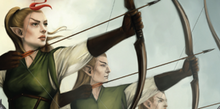
Lowborn Elves
The Elves were not always at one with nature, but after their fall from grace, many found a new, deepened connection with the wilds. As successive generations were born and raised in Mennara, they felt an even greater calling to the world around them rather than the lofty heavens of their distant ancestors. They resolved to live in harmony with their new home and become its greatest protectors.
It is from these Elves that the bulk of the Latari armies are drawn. Among the lowborn Elves are the famed Deepwood Archers, unrivaled in lethality with their extraordinary longbows, and the Leonx Riders and their fearsome feline mounts. Many leave Elven society entirely for a life of purpose and adventure experiencing the world.
Salishwyrd Elves
Amid the ice and snow of Isheim is a hidden realm. In stark contrast to the surrounding lands sits the Green Vale, home of the last Salishwyrd city. It is perhaps Isheim’s greatest secret, and rightly so, for the Elves who built it millennia ago did so to escape the Rime Storm that had destroyed their empire and to protect themselves from all outside dangers.
The Green Vale is a place of potent magic, ruled over by an immortal king— a lost exile of a forgotten age who awaits the time when the Rime Storm might be defeated and the Salishwyrd rise again from the frozen ashes of their empire.
In preparation for this day, the Salishwyrd Elves have become masters of healing and life magics, hoarding artifacts of sorcery from the dawn of Mennara, and there is little they cannot mend of flesh or mind.
References
- Realms of Terrinoth
- Legacy of Dragonholt

